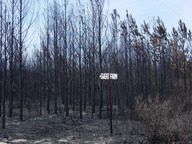According to the AP, Ga. foresters brace for busy wildfire season:
The nearterm effects:A cold, wet winter has left northern parts of the state in decent shape, but in southern Georgia river flows and soil moisture are both at some of the lowest points that would be expected in a century, said David Stooksbury, Georgia’s state climatologist at the University of Georgia.
“We have a good fuel load with plenty of dry vegetation, the soil is dry and there’s a low relative humidity and there’s wind,” Stooksbury said. “That is the simple recipe for a trash fire to get out of control very quickly and become a wildfire.”Yes, Sunday Georgia Forestry cut off burn permits in Lowndes County because some fires had gotten out of control.
The long term problem?
 We need to
put parameters on the types of industry we want to attract
including
Ben Copeland’s questions:
We need to
put parameters on the types of industry we want to attract
including
Ben Copeland’s questions:
Water is going to be very important as we expand our industrial base. Because we’re going to have folks who like to start up jobs here because of the water we have. How much of that water can be used to sustain jobs. Those are the questions….
In this radio interview with WABE of 24 January 2011, David Stooksbury remarked that:
And actually much of Georgia is already classified as being in at least in moderate drought. Particularly the southern 2/3 of the state is already classified.And that was in January.
 After we already had
a big drought in 2007
in which
many trees were burned up.
After we already had
a big drought in 2007
in which
many trees were burned up.
What’s the state doing to help? More penny-wise pound-foolish budget cuts, of course!
Some in Georgia’s $19.7 billion timber industry worry about whether state foresters can handle a busy season after two years of budget cuts that slashed about 30 firefighters from the Forestry Commission’s payroll, leaving it with about 400.I’m a member of the Georgia Forestry Association and I like GFA, but it was GFA what recently pushed through major tax cuts for big timber owners.The cuts also shrunk the agency’s fleet of fire tractors by 10 percent to about 300, and they required forestry officials to close 16 out of 128 fire control offices positioned across the state for quick response to wildland fires.
“We must be getting close to where budget cuts, if they get too severe, start cutting through the meat and into the bone,” said Steve McWilliams, president of the Georgia Forestry Association, which represents timber owners and wood product manufacturers. “The losses have been held in check by the small average size of the wildfires. But any fire can become a major fire.”
With fewer staff and less money, Dozier said, the cutbacks have mainly forced delays in aid the Forestry Commission typically provides to timberland owners to help prevent fires — such as controlled burning of underbrush and plowing firebreaks around a property with a tractor.
Short Link: